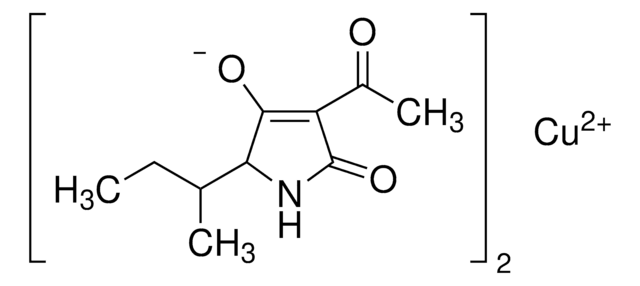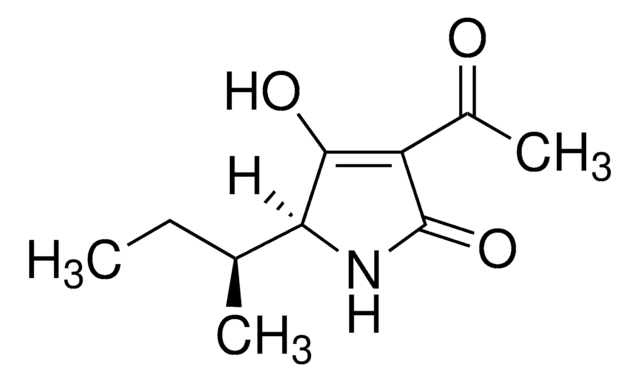U2625
Uric acid
≥99%, crystalline
Synonym(s):
2,6,8-Trihydroxypurine
Sign Into View Organizational & Contract Pricing
All Photos(4)
About This Item
Empirical Formula (Hill Notation):
C5H4N4O3
CAS Number:
Molecular Weight:
168.11
Beilstein:
156158
EC Number:
MDL number:
UNSPSC Code:
12352005
PubChem Substance ID:
NACRES:
NA.55
Recommended Products
Assay
≥99%
form
crystalline
mp
>300 °C (lit.)
SMILES string
O=C1NC(=O)C2=C(N1)NC(=O)N2
InChI
1S/C5H4N4O3/c10-3-1-2(7-4(11)6-1)8-5(12)9-3/h(H4,6,7,8,9,10,11,12)
InChI key
LEHOTFFKMJEONL-UHFFFAOYSA-N
Looking for similar products? Visit Product Comparison Guide
Application
Uric acid has been used:
- in inducing hyperuricemia in mice
- as a component of digestion fluid for the simulation of in vitro human digestion model
- in selectivity test of the glucose sensor in sweat-based diabetes monitoring
Biochem/physiol Actions
Uric acid is an insoluble catabolite produced by adenine and guanine metabolism. Accumulation of uric acid leads to gout, hyperuricemia, arthritis and renal failure. Elevated uric acid levels contributes to hypertension and pathogenesis of cardiovascular disease. Low uric acid levels associated with Parkinson′s disease and multiple sclerosis, may elicit protective functionality. High levels of uric acid in patients with chronic obstructive pulmonary disease (COPD) may serve as potential marker for diagnosis.
Storage Class Code
11 - Combustible Solids
WGK
WGK 2
Flash Point(F)
Not applicable
Flash Point(C)
Not applicable
Personal Protective Equipment
dust mask type N95 (US), Eyeshields, Gloves
Certificates of Analysis (COA)
Search for Certificates of Analysis (COA) by entering the products Lot/Batch Number. Lot and Batch Numbers can be found on a product’s label following the words ‘Lot’ or ‘Batch’.
Already Own This Product?
Find documentation for the products that you have recently purchased in the Document Library.
Customers Also Viewed
Uric acid in plants and microorganisms: Biological applications and genetics-A review
Hafez RM, et al.
Journal of Advanced Research, 8(5), 475-486 (2017)
A graphene-based electrochemical device with thermoresponsive microneedles for diabetes monitoring and therapy
Lee H, et al.
Nature Nanotechnology, 11(6), 566-566 (2016)
Reduction of Serum Uric Acid Associated with Attenuation of Renal Injury, Inflammation and Macrophages M1/M2 Ratio in Hyperuricemic Mice Model
HARYONO A, et al.
Kobe J. Med. Sci., 64(3), E107-E114 (2018)
Serum uric acid: a risk factor and a target for treatment?
Feig DI, et al.
Journal of the American Society of Nephrology, 17(4), S69-S73 (2006)
Uric acid, hyperuricemia and vascular diseases
Jin M, et al.
Frontiers in Bioscience, 17, 656-656 (2012)
Our team of scientists has experience in all areas of research including Life Science, Material Science, Chemical Synthesis, Chromatography, Analytical and many others.
Contact Technical Service











